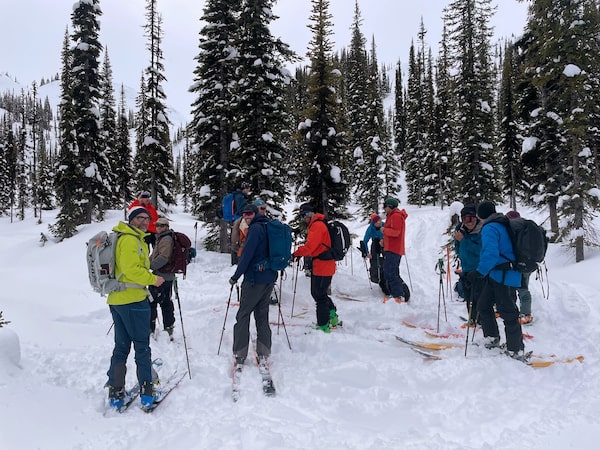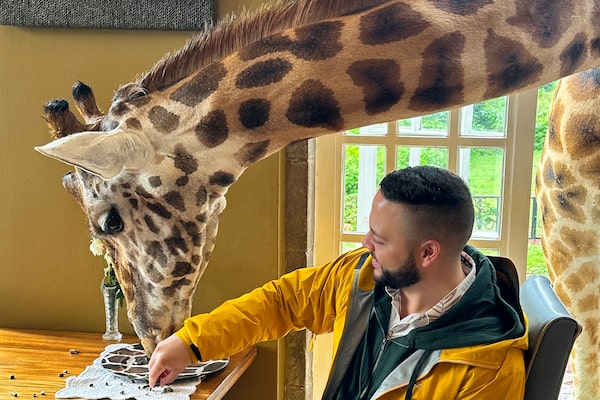Good morning, and welcome to the weekend.
Grab your cup of coffee or tea, and sit down with a selection of this week’s great reads from The Globe.
In this issue, Ian Brown tells the story of a backcountry skiing trip mostly sidelined by climate change. Brown has been skiing since he was three-years-old. The Globe reporter said he fell in love with the sport because he loved being outdoors in the winter. In his late twenties, he grew an appreciation especially for backcountry skiing – for the physical challenge and the close companionship it offers. But he worries now that winters as he’s known them are over.
“Winter is a huge part of what makes us who we are – not just as Canadians, but as human beings. And not just physically, but culturally and psychologically,” Brown said. “Before central heating came along in the 19th century, winter was a season you had to survive; you had to adapt. That challenge – and the satisfaction and pleasure of making yourself comfortable in an otherwise hostile environment – was a huge part of what created us, that made us who we are. If winter disappears, those challenges, and those thrills, also disappear.”
Also from The Globe, Tim Kiladze reports on the pitfalls of investing in private debt funds. And Ming Wong asks the question: if emojis transcend language, why can’t any of us agree on what each one means?
If you’re reading this on the web, or it was forwarded to you from someone else, you can sign up for Great Reads and more than 20 other Globe newsletters on our newsletter sign-up page. If you have questions or feedback, drop us a line at greatreads@globeandmail.com.
What we lose when we lose winter

It’s hard to describe the complete physical pleasure that skiing even a single run of powder can produce, Ian Brown writes.Ian Brown/The Globe and Mail
Ian Brown knows that his final ski days are coming. And that one morning, he’ll wake up and realize that he physically can’t manage skiing any more – and that will be the thrilling price of having lived. He wants at least one more real winter to tell him if it’s time to stop. But after his backcountry ski trip in January is shortened due to El Niño, Brown comes to the chilling realization that climate change may make that decision for him instead.

Photo illustration by The Globe and Mail/iStockPhoto / Getty Images
Canadians are flying blind when they invest in private debt funds, and Tim Kiladze reports that when things go bad, there aren’t many safeguards to protect them. Private debt funds boomed when rates were low and a broader range of investors, including everyday retail investors, were hunting for a decent return. Now, with high rates and many investments struggling, the question is whether retail investors are well-served by these funds. Some buyers do not have the financial sophistication to understand the ins and outs of private debt, and fund managers often aren’t required to report major developments. Ordinary investors are left feeling trapped and alone.
If emojis are a universal language, why can’t we agree on what they mean?

Some emojis may be universally understood, but others are major material for misinterpretation.The Globe and Mail
Each new emoji proposal is submitted to the consortium with documentation on its intended use. But once the final version lands on your phone, interpretations are up to the user. Some emojis may be universally understood, but some also lead to serious misinterpretations based on a variety of factors such as age and culture. Ming Wong walks us through a culture of misunderstandings, one 😀, 🎉, and 🤠 at a time.
Pro-democracy Russians abroad face danger, voter suppression as Kremlin holds election
Roman Udot is a data analyst from "Golos" election monitoring organization, banned in Russia.Anton Skyba/The Globe and Mail
Mark MacKinnon reports from Vilnius, the capital of Lithuania and currently a hub for Russia’s pro-democracy movement. Saturday marks the second day of Russia’s three-day presidential election, two years into the war in Ukraine. After opposition leader Alexey Navalny’s death – which his allies refer to as a murder – Russia’s battered pro-democracy advocates overseas report feeling less safe than usual.
The 85-year search to retrieve a stolen Stanley Cup ring

Siblings Curtis Lahey and Jennifer Lahey, Hall of Fame hockey player Syd Howe’s great-grandchildren, look through a family scrapbook of photos of the Detroit Red Wings’ NHL star. Syd Howe’s long-lost Stanley Cup winning ring from the 1936-37 season will soon be back with his family.Melissa Tait/The Globe and Mail
Marty Klinkenberg writes about one family’s quest to get back their great-great-grandfather’s Stanley Cup ring. The precious piece of jewelry belonged to Syd Howe (no relation to Gordie), who was a member of the Detroit Red Wings and received the ring in 1937. A mere two years later, Howe was playing cards on a train between Chicago and Detroit when the ring went missing. Now, his family – who had lost hope it would ever be found – has discovered that it was being sold by a New York auction house.
Measha Brueggergosman-Lee unleashes a Zombie Blizzard of Margaret Atwood’s poetry
Soprano Measha Brueggergosman and composer Aaron Davis photographed on Feb 14, 2024. Their new album, Zombie Blizzard, is a song cycle of seven concert arias for voice, jazz trio and brass orchestra, based on Margaret Atwood’s 2020 book of poetry, Dearly.Fred Lum/The Globe and Mail
Brad Wheeler profiles soprano Measha Brueggergosman, whose newly released Zombie Blizzard is an album of jazzy concert arias that comes with a separate set of Atwood’s spoken-word readings.
Hand-feeding giraffes in Kenya lives up to the hype

After breakfast at the palatial Giraffe Manor, the windows are opened and giraffes reach in through the open windows looking for food.Luis Cabrera/Supplied
At Kenya’s Giraffe Manor, more than 50 giraffes have been born and returned to the wild. And through initiatives like the Giraffe Sponsorship program, conservationists who work at the hotel have raised more than US$100,000. Photographs of guests hand-feeding giraffes have gone viral, and Luis Cabrera was curious: would it live up to the hype? After flying in for his birthday, Cabrera tells us about his once-in-a-lifetime experience.
Take this week’s arts quiz
Canadian icon Neil Young is returning to Spotify two years after bailing on the streaming platform over its partnership with whom?
c. Joe Rogan
d. Alex Jones